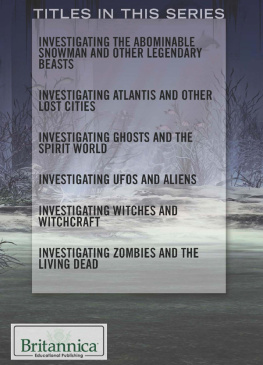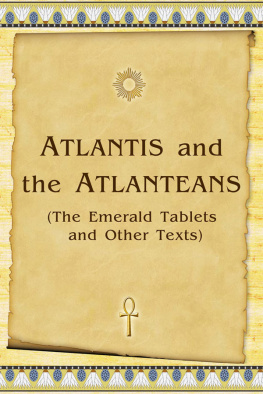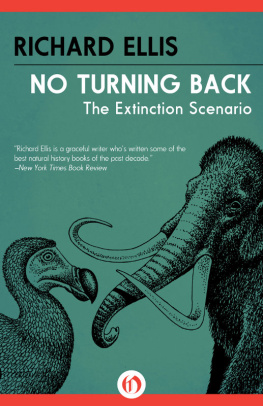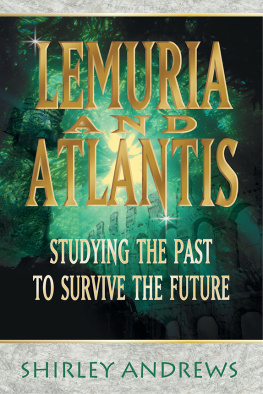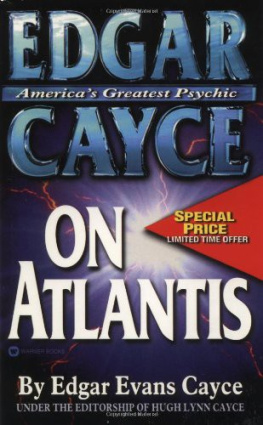Richard Ellis - Imagining Atlantis
Here you can read online Richard Ellis - Imagining Atlantis full text of the book (entire story) in english for free. Download pdf and epub, get meaning, cover and reviews about this ebook. year: 1999, publisher: Vintage Books, genre: Art. Description of the work, (preface) as well as reviews are available. Best literature library LitArk.com created for fans of good reading and offers a wide selection of genres:
Romance novel
Science fiction
Adventure
Detective
Science
History
Home and family
Prose
Art
Politics
Computer
Non-fiction
Religion
Business
Children
Humor
Choose a favorite category and find really read worthwhile books. Enjoy immersion in the world of imagination, feel the emotions of the characters or learn something new for yourself, make an fascinating discovery.

- Book:Imagining Atlantis
- Author:
- Publisher:Vintage Books
- Genre:
- Year:1999
- Rating:4 / 5
- Favourites:Add to favourites
- Your mark:
- 80
- 1
- 2
- 3
- 4
- 5
Imagining Atlantis: summary, description and annotation
We offer to read an annotation, description, summary or preface (depends on what the author of the book "Imagining Atlantis" wrote himself). If you haven't found the necessary information about the book — write in the comments, we will try to find it.
Imagining Atlantis — read online for free the complete book (whole text) full work
Below is the text of the book, divided by pages. System saving the place of the last page read, allows you to conveniently read the book "Imagining Atlantis" online for free, without having to search again every time where you left off. Put a bookmark, and you can go to the page where you finished reading at any time.
Font size:
Interval:
Bookmark:
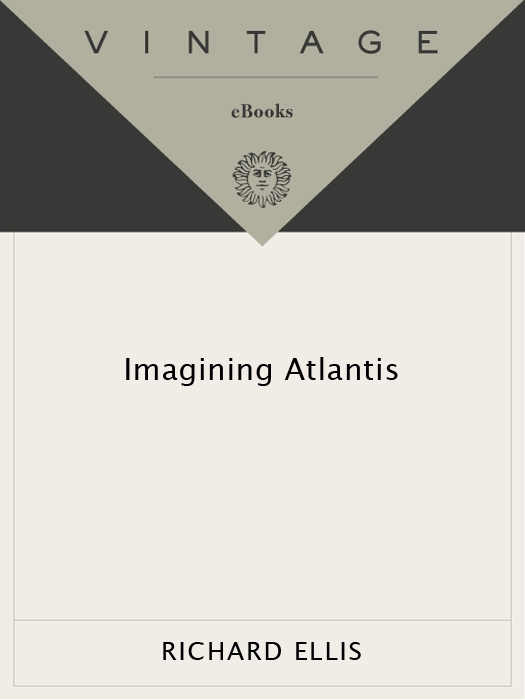
Impressive. An important volume in the library of Atlantis literature.
San Francisco Chronicle
Quite a read. Engaging.
The Hartford Courant
Truly charming, funny, and assiduous. Ellis spirit of non-judgmental inquisitiveness [is] above and beyond the call of duty.
Newsday
Richard Ellis takes us on a fascinating ride, throwing in lessons in archaeology, history, geology, mythology and art.
Fort Worth Star-Telegram
[Ellis] shows that, true or not, the very idea of Atlantis is humanly necessary, soothing some yen that all of us have for mysteries that hover always, like a mirage, just beyond the verge of explanation.
The News & Observer [Raleigh]
In tracing both the scientific pursuit and numerous unscientific flights of fancy, Ellis gracefully imparts much about the history of archaeology and cartography, and the perennial yearning for lost worlds and romantic adventure.
Outside

RICHARD ELLIS
IMAGINING ATLANTIS
Richard Ellis is the author of seven previous books, including The Book of Whales, Dolphins and Porpoises, Monsters of the Sea, and Deep Atlantic. He is also a celebrated marine artist whose paintings have been exhibited in museums and galleries around the world, and has written and illustrated articles for numerous magazines, including Audubon, Readers Digest, National Geographic, and Scientific American. He lives in New York City.
ALSO BY RICHARD ELLIS
THE SEARCH FOR THE GIANT SQUID
THE BOOK OF WHALES
DOLPHINS AND PORPOISES
THE BOOK OF SHARKS
MEN AND WHALES
MONSTERS OF THE SEA
GREAT WHITE SHARK
( WITH JOHN MCCOSKER )
DEEP ATLANTIC
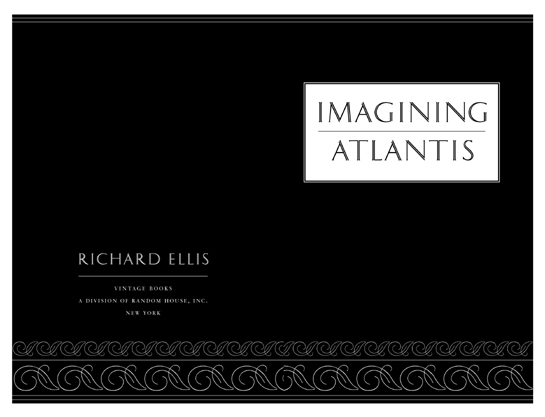

FIRST VINTAGE BOOKS EDITION, AUGUST 1999
Copyright 1998 by Richard Ellis
All rights reserved under International and Pan-American Copyright Conventions. Published in the United States by Vintage Books, a division of Random House, Inc., New York, and simultaneously in Canada by Random House of Canada Limited, Toronto. Originally published in hardcover in the United States by Alfred A. Knopf, Inc., New York, in 1998.
Vintage Books and colophon are registered trademarks of Random House, Inc.
The Library of Congress has cataloged the Alfred A. Knopf edition as follows:
Ellis, Richard,
Imagining Atlantis / by Richard Ellis. 1st ed.
p. cm.
eISBN: 978-0-307-42632-1
1. Atlantis. I. Title.
GN 751 .E 55 1998
001.94dc21 97-48432
Author photograph David Ellis
www.vintagebooks.com
v3.1
T HERE IS something marvelously organicand unexpectedabout the way one book grows out of another. In 1980, when I had submitted the manuscript and illustrations for a comprehensive book on the cetaceans of the world, Ash Green, my wise editor (then as now), recommended that I break it up into two parts. The first became The Book of Whales, and two years later, after a lot of revisions, Dolphins and Porpoises appeared. Monsters of the Sea grew out of my inability to incorporate the entire Atlantic Ocean into a single book; when I tried to add sea monsters to this unmanageable hodgepodge, I ended up quitting the Atlantic and detouring into a study of giant cephalopods, sea serpents, mermaids, man-eating sharks, and ship-sinking whales. But then, having found a way to return to the back-burner Atlantic project, I (figuratively) descended into the depths, brought up Deep Atlantic, and wrote about sea-floor spreading, submersible exploration, hydrothermal vents, and the weird and wonderful creatures of the abyss. I was once again trying to encompass everything that had to do with my putative subject, and for no better reason than to be able to answer the common question Are you going to include Atlantis? I began a search for information on the Lost Continent. There was more about Atlantis than I had imagined possible, but it had no legitimate place in a book about the geology, exploration, and natural history of the depths. So I turned in the manuscript and the drawings for Deep Atlantic, and encouraged by the steadfast support of the people at Knopf, I sallied forth in search of Atlantis.
In one way, the search for the Lost City was easy; it seems that almost everybody, from Plato to Francis Bacon, from Jules Verne and Arthur Conan Doyle to Edgar Cayce and Charles Berlitz, had something to say on the subject. Even Indiana Jones had an opinion. But it was not so easy to ascertain exactly what the subject actually was. Was it a prehistorical myth whose origins are lost? Was it somehow related to the 1500 B.C . eruption of an Aegean volcanic island whose repercussions might have destroyed an entire civilization? Did it have to do with pre-Columbians? Ancient Egyptians? Extraterrestrials? Where was I to look for the information? Archaeological journals? The Bulletin of Volcanology? Bulfinchs Mythology?
Atlantis has been the subject of so many stories, fables, novels, and movies that it was obvious there was not going to be a single answer. Was there ever a real Atlantis, or has it been a metaphor or symbol for so many things that its reality is forever buried, like Herculaneum, under the accumulated debris of centuries of speculation?
Another, even more important question is Why bother? Thousands of books have already been written about Atlantis. In his less than laudatory review of Peter Jamess 1995 The Sunken Kingdom: The Atlantis Mystery Solved, Nigel Spivey wrote, To witness a soul sucked into the maw of Atlantis would be horrible, if it were not a volunteered folly. There is no universal edict requiring such martyrs. Still they come forward, brimming with the usual hubris of solution and resolution. Unlike James (who thought he had solved the mystery by placing Atlantis in Anatolia), I offer no new or revolutionary explanation. Rather, I believe that Plato wrote the story for his own reasonswhich reasons we might be able to guess atand that those who followed him either embellished an already rich and complex tale with enough complications to make their interpretations crumble like the fabled city itself or approached it from such peculiar vantage points that their creativeness, contumaciousness, or gullibility requires some sort of acknowledgment. Atlantis is such an abundant field for study, that even if we never find a single Atlantean artifact, a long-lost hieroglyphic inscription, or any geological evidence of a sunken landmass, the legend of the Lost Continent will perdure in the human consciousness.
Many may think that this book contains too many quotes and excerpts from other books. I plead guilty to overciting, but with extenuating circumstances. I believe that most later versions of the Atlantis story are misguided, exaggerated, or just plain incorrect, and that it would be insufficient to say that Ignatius Donnelly is an old humbug or Charles Berlitz is irresponsible without offering evidence to support such assertions. To get a sense of the nature of Atlantean research, I think it is necessary to read what Charles Pellegrino actually wrote, or what Robert Ferro and Michael Grumley thought they were doing when they sailed to Bimini.
Font size:
Interval:
Bookmark:
Similar books «Imagining Atlantis»
Look at similar books to Imagining Atlantis. We have selected literature similar in name and meaning in the hope of providing readers with more options to find new, interesting, not yet read works.
Discussion, reviews of the book Imagining Atlantis and just readers' own opinions. Leave your comments, write what you think about the work, its meaning or the main characters. Specify what exactly you liked and what you didn't like, and why you think so.




